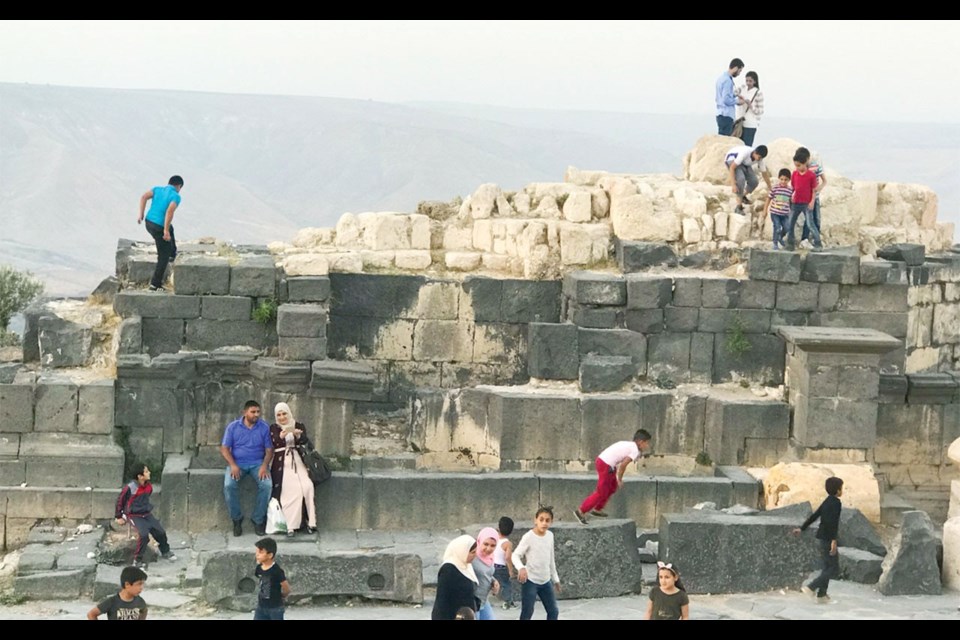Jordanian beekeeper Yousef Adle Sayah has worked hard to learn enough English to show foreigners around his beehives in the village of Umm Qais, by the Syrian border. But when he gets really worked up, English fails him. "Bees have a world of order. And a life with order is a good life," he tells my group through a translator. Bees have a queendom, they have laws of the land, and a council of 400 to 500 experts who check adherence to the constitution. Even the queen must comply. Her duty? To lay lots of eggs.
"If she is lazy or unable, she is not doing her role. So the higher council alerts her by building a large cocoon as a warning sign. This symbolizes that they're going to start growing another queen. If she sees this, she should get her act together."
Properly hyped up by the bee legal system, we don our beekeeper gear. The loose white jumpsuits, gloves and head coverings with mesh face cutouts make us look like astronauts. Sayah warns us that the colour red angers bees, so I cover my red shoes with white cloth booties. I hang back as we approach the hives — those of us with bee allergies prefer our bees at a distance. But I'm still close enough to see the opening of the hives, the thick honey and the large body of the queen. The buzzing and frenzied activity is captivating. And beekeeping is just our first cultural experience in a jam-packed day.
Welcome to Umm Qais
According to tourism entrepreneur Muna Haddad, visitors used to stop off at the village of Umm Qais — population 7,000 — for about two hours, or the time it took to tour Roman ruins at the archeological site called Gadara. Now that she's opened a bed and breakfast and created a slate of cultural activities, some visitors stay two or three days.
Haddad, 32, runs an Amman-based consulting firm called Baraka Destinations. She started her pilot project in sustainable tourism development at Umm Qais two-and-a-half years ago. Haddad met with community members who decided to focus on agritourism and ecotourism, offering guided hikes and bike trips, cooking classes, basket weaving and beekeeping. So far, villagers have undergone more than 1,300 hours of training. "It's about packaging the experience, marketing, communication, language," she says. Everything from language to willingness to be photographed — a no-no for women in Jordanian culture, while a must for Instagram-obsessed foreigners — has to be addressed.
Outside donors have pumped money into bolstering Jordan's stability within a troubled region. But short-term fixes don't work. "It takes years to develop, to deliver quality," Haddad says. "To attract tourists, you need an entire destination. We develop a cluster of activities. We develop a destination." Haddad doesn't believe in trying to cater to everyone. "Philanthropy has to be a proper business. It's not just "Come and take a picture with a brown child." It's important to get the right people to come that respect the place." And don't expect bargains. "It's not cheap because that's what it costs."
Olives are Paramount
Olives are vital to Umm Qais' economy. Luckily, I visited Jordan in October, so was able to experience the month-long harvest. After picnicking in an orchard, we picked olives and helped sort out leaves and branches. Then we stopped by a factory to see olives transformed into olive oil. The olives travel through machines that remove the pits and crush them into olive oil. The pits are saved to be made into jift, dried and pressed olive pits used as fuel. Even though the workers were obviously busy, Arab hospitality is strong. Within minutes of our arrival, a young man handed us tiny cups of strong Turkish coffee.
The olive theme continues as we move on to take a cooking lesson in Galsoum's Kitchen, led by cook Galsoum herself. The dishes: pickled olive salad and a bread called Grass al Eid, which is heavy with olive oil. Later, Galsoum will serve us dinner in a room kitted out with floor cushions and a low table to hold the dinner feast, including vegan dishes for me.
That night, I lie down in a twin bed in the Beit Al Baraka B&B. Since this is the only place to stay in Umm Qais, my tour group of 11 has doubled and tripled up in rooms, something we're not used to. I'm not sure if I'll be able to sleep, especially since both roommates warn that they snore. But it's been such a long day of cultural experiences, I drift right off. We sleep until the five a.m. call to prayer spreads over the village.
To read more on Teresa's trip to Jordan go to www.piquenewsmagazine.com, Dec.14.




